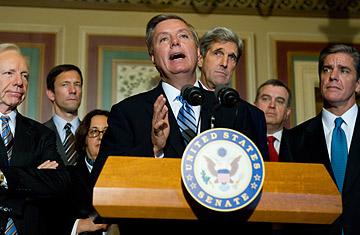
Senator Lindsey Graham, center, speaks to the media following a meeting with CEOs about climate change at the US Capitol in Washington, DC, on December 3, 2009.
A few weeks ago, at the end of a 40-minute Oval Office huddle on climate change between President Barack Obama and Republican Senator Lindsey Graham — one of many tête-è-têtes on various subjects between the two this year — Obama leaned forward. "Look Lindsey, I'm ready to play," he said. "I'm for nuclear power. I'm for responsible offshore drilling. I'm for clean coal. I just need a reasonable emissions standard."
"Count me in," Graham replied. "Let's see if we can do it."
Wait, you may ask, a conservative Republican is seriously negotiating with the President? And on global warming, of all things?
Lindsey Graham, however, is not your average Republican. In an era when the GOP is defining itself by saying no, the South Carolinian stands out as one willing to say, "Maybe, let's talk." On hot button issues from Afghanistan and climate change to immigration, Graham is often the only Republican in the room. And as past mavericks have turned away, such as Obama's erstwhile opponent John McCain, Graham has stepped up. He is the first call White House Chief of Staff Rahm Emanuel makes for advice on how to handle Senate Republicans; he's a popular co-sponsor of bipartisan legislation; and he's become a sounding board for top Dems.
Not surprisingly, such unorthodox behavior doesn't come without cost. With tea party activists increasingly dictating the party's agenda, moderate Republicans are getting eaten by their own, and it didn't take long for some of Graham's once loyal supporters to turn on him. The Charleston County Republican Party voted unanimously last month to censure Graham on a litany of complaints. They claimed that South Carolina's senior senator "in the name of bipartisanship continues to weaken the Republican brand and tarnish the ideals of freedom, rule of law, and fiscal conservatism." The group, closely aligned with the Tea Party movement, accused Graham of holding the GOP "hostage" for engaging on global warming and even lambasted him for having "stated on many occasions that his primary concern is to 'be relevant.'" Graham, who won reelection in a landslide last year, isn't worried. "I've never felt threatened by people who say that it's a crime or sin to work with the other side because most Republicans and Democrats understand that for the good of the country you have to do that," he said in an interview just off the Senate floor.
Graham was elected to the House in 1994, one of 32 Republican candidates who signed on to Newt Gingrich's Contract with America. A former Air Force lawyer, Graham drew national attention in 1998 as one of the managers of the House's impeachment of President Bill Clinton. Still, in 2000, he bucked the GOP establishment's pick of George W. Bush and backed McCain in the Palmetto State primary. After Graham won his Senate seat in 2002, he and McCain became close. The Arizona senator, 73, often says Graham, 54, is like a son to him, and perhaps a little of McCain's maverickness rubbed off.
In recent years Graham has developed a reputation as an independent dealmaker. In 2005 he joined with 13 moderates to block then Senate Majority Leader Bill Frist from destroying the filibuster in a fight over judicial nominees. In 2006 and 2007 he braved another censure — this one from Greenville County — to work with Ted Kennedy on immigration reform, telling incensed South Carolinians that they're "bigots."
